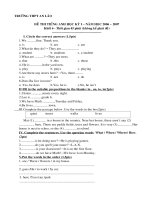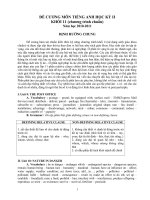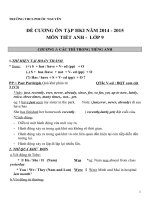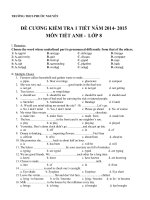Tổng hợp đề cương môn tiếng anh (11)
Bạn đang xem bản rút gọn của tài liệu. Xem và tải ngay bản đầy đủ của tài liệu tại đây (105.49 KB, 5 trang )
TRƯỜNG THCS PHƯỚC NGUYÊN
ĐỀ CƯƠNG ÔN TẬP HKI NĂM 2014 - 2015
MÔN TIẾT ANH - LỚP 7
A. TENSES
1. Formation
TENSES
Positive
Negative
S + do/does not +
V(bare inf)
Question
The Present
Simple
S + V/V(-s,-es)
Do/Does + S +
V(bare-inf)?
The Present
Progressive
S + am/is/are + V(- S + am/is/are + not + Am /is/are + S +V(ing)
V(-ing)
ing)?
The Near Future S + be going to +
V(bare ing)
S + be + not + going
to + V(bare ing)
be + S + going to +
V(bare ing)?
The Future
Simple
S + will + not +
V(bare inf)
Will + S + V(bare
inf) ?
S + will + V(bare
inf)
2. The adverbs of time
TENSES
The adverbs of time
The Present
Simple
always, usually, often, sometimes, seldom, never, every day/
week/month/year…
The Present
Progressive
Look!..., Listen!...., at the moment, now, at present…
The Near Future
For intentions in the future (tonight, tomorrow, this evening,
next week/month/year…)
The Future Simple For prediction, promise, offer, for the future (someday, one
day, soon, tonight, tomorrow, next week/month/year, this
evening,…)
B. MODALS
MODALS
Positive
Negative
Question
Can (có thể)
S + Can + V(bare
inf)
S + Can + not +
V(bare inf)
Can + S + V(bare
inf)?
Must (phải)
S + must + V(bare
inf)
S + must + not +
V(bare inf)
Must + S + V(bare
inf)?
S + have to /has to
+ V(bare inf)
S + do /does + not
+have to + V(bare
inf)
Do/Does + S +
have to + V(bare
inf)?
May / Might
(có lẽ)
S + may/might +
V(bare inf)
S + may/might + not + May/might + S +
V(bare inf)
V(bare inf)?
Will (sẽ)
S + will + V(bare
inf)
S + will + not +
V(bare inf)
Will + S + V(bare
inf)?
Should (nên)
S + should+
V(bare inf)
S + should + not +
V(bare inf)
Should + S +
V(bare inf)?
V-ing
V(bare inf)
Have To/Has
To (phải)
C. VERB FORM
To V hay V(to-inf)
would like (‘d like) + to V enjoy + V-ing
need+ to V
like + V-ing / + to V
make + O + V (make + O
+ adj)
want+ to V
hate + V-ing
keep + O + V(bare inf)
want + O + to V
dislike + V-ing
help + O + V(bare inf)
want + O + not to V
love + V-ing
learn+ to V
practise + V-ing
see/ watch + O + V(bare
inf)
learn how + to V
to be interested in + V-ing
prefer + to V
prefer V-ing + to + V-ing
It takes + O +
….minutes/hours + to V
S + spend + t.gian + (on)
+ V-ing
tell / ask + O + to V
SUGGESTIONS
Don’t forget + to V
what about + V-ing
had better + V(bare inf)
SUGGESTIONS
Let’s + V(bare inf)
Why don’t we + V(bare
inf)...?
Why don’t you + V(bare
inf)...?
= Remember + to V
How about + V-ing
Should we + V(bare ìnf)
…?
S + to be + adj + to V
D. COMPARISON
KINDS OF
ADJECTIVES
EQUALITY
COMPARATIVE
SUPERLATIVE
Short Adj
As + adj + as adj -er + than
the + adj -est
Long Adj
As + adj + as more +adj +than
The most + adj
* Các tính tư có 2 âm tiết tận cùng bằng y chuyển y => i rồi thêm er
Ex: happy => happier
noisy => noisier
early => earlier
* Comparative (so sánh hơn) dùng để so sánh 2 đối tượng, trong câu thường có từ
‘than’
* Superlative (so sánh nhất) dùng để so sánh 3 hay nhiều đối tượng trở lên. Trong câu
thường có ‘in’ (in the class, in the world) hay ‘of’ (of the three, of all…)
Exceptions
EQUALITY
COMPARATIVE
SUPERLATIVE
1. good / well
better
the best
2. few + Danh từ đếm được (số nhiều)
fewer
the fewest
3. little + Danh từ không đếm được
less
the least
4. many + Danh từ đếm được (số nhiều) more
the most
5. much + Danh từ không đếm được
the most
more
6. bad / badly
worse
E. EXCLAMATION (Câu cảm)
the worst
What + (a / an) + adjective + Noun!
Ex: a) Nam is very intelligent. => What an intelligent boy! c) Those girls are nice. =>
What nice girls!
b) This film is very boring. => What a boring film!
=> What awful weather!
d) The weather is awful.
F. QUESTIONS
Kinds of
verb (các
loại động
từ)
Wh-words (vấn từ)
Auxiliary
(trợ động
từ)
To be
Who (ai)
is
What (gì)
are
What time (mấy
giờ)
Auxiliaries Which (nào)
(các trợ
Which class (lớp
động từ)
nào)
Modals
(các động
từ tình
thái)
Which grade (khối
nào)
When (khi nào)
Why (tại sao)
Where (ở đâu)
How (như thế nào)
How old (mấy tuổi)
Subject (chủ ngữ)
V(bare inf)
hay V(-ing)
he, she, it, Nam, this, V(-ing) (khi
that
ở thì tiếp
diễn)
we, you, they, Nam
and Lan, these, those
does
he, she, it, Nam
do
we, you, they, Nam
and Lan
can
he, she, it, Nam
may
we, you, they, Nam
and Lan
might
V(bare inf)
V(bare inf)
will
should
must
1. What does your father do? 2. What time is it? 3. Which is mine? (cái nào của tôi)
4. How old are you?
5. Which class are you in?
6. Which grade are you in?
7. When do you have Literature?
8. Why are you late for school?
9. Where does your father
work? 10. How do you go to school?
11. How far is it from you house to the school?
12. How often do you go to art club?









